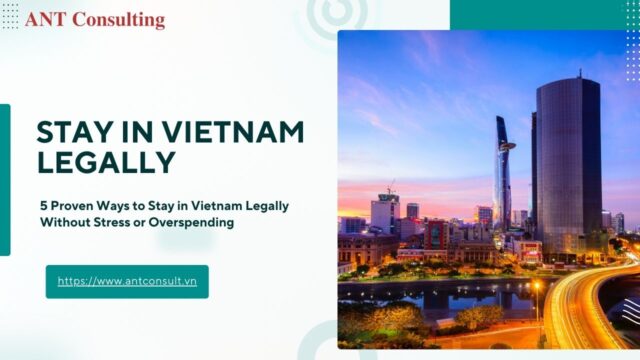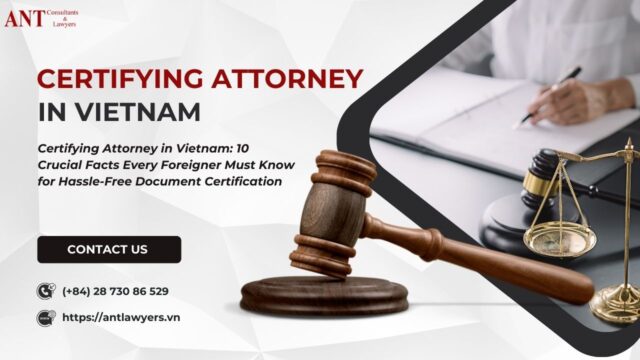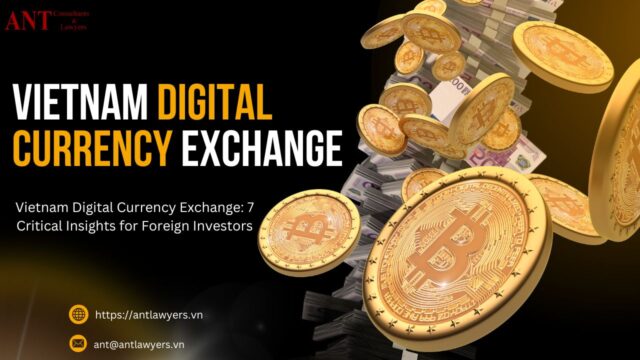The Challenge of Finding Affordable Ways to Stay in Vietnam Legally
Vietnam has become one of the most attractive destinations for expats, digital nomads, and retirees. Its low cost of living, rich culture, and welcoming environment make it an ideal place to live. However, many foreigners struggle with one major question: how can they stay in Vietnam legally without facing unnecessary expenses or complicated bureaucracy?
For some, the most convenient choice is a 90-day e-visa combined with regular visa runs, but this approach can be both expensive and unpredictable. Others look for more stable solutions such as work permits, student visas, business investments, or even marriage-based residency. Each of these options has different financial and legal requirements, making it essential to find the best fit based on long-term goals and budget to stay in Vietnam legally.
If you are looking for a reliable way to stay in Vietnam legally, this guide will break down seven cost-effective options, ranked from the least expensive to the most costly. Whether you are a freelancer, an entrepreneur, or someone seeking permanent residence, this article will help you understand the best visa options to remain in Vietnam legally and affordably.
The 90-Day E-Visa and Visa Runs: The Low Cost But Least Stable Option
For many foreigners, the easiest and most cost-effective way to stay in Vietnam legally is by using a 90-day e-visa and renewing it through visa runs. While this approach requires frequent travel, it allows individuals to remain in the country with minimal legal and financial commitments.
How It Works
The Vietnamese government offers a 90-day e-visa that can be obtained online. The cost is around $50 for multiple entries. Before the visa expires, travelers must exit the country, apply for a new visa, and return. Many expats choose to fly to nearby countries like Thailand, Malaysia, or Cambodia, while others prefer land border crossings.
Annual Cost Estimate
- Visa fees: $100 – $200
- Flights or land border runs: $500 – $1,800
- Total estimated cost: $650 – $2,000 per year
Pros and Cons
Pros:
- The lowest cost and simplest way to stay in Vietnam legally.
- No long-term commitments such as employment or business registration.
- A good option for digital nomads and short-term visitors.
Cons:
- Requires leaving the country every 90 days.
- Visa policies can change, making long-term stability uncertain.
- Some foreigners have been denied re-entry after repeated visa runs.
Who Should Consider This?
This method is ideal for digital nomads, part-time residents, or those testing life in Vietnam before committing to a long-term visa.
Student Visa: Stay in Vietnam Legally While Learning the Language
For those who want to stay in Vietnam legally while also gaining valuable language skills, a student visa is an excellent choice.
How It Works
To qualify, individuals must enroll in a Vietnamese language school that offers visa sponsorship. The visa is typically valid for six months to one year and can be renewed as long as the student remains enrolled.
Annual Cost Estimate
- Tuition fees: $1,000 – $3,000
- Visa extension fees: $100 – $200
- Total estimated cost: $1,100 – $3,200 per year
Pros and Cons
Pros:
- A legal and stable way to stay in Vietnam without frequent travel.
- Learning Vietnamese improves integration into local life.
- No need for employer sponsorship or investment.
Cons:
- Requires actual attendance in classes.
- Some schools charge high fees for visa sponsorship.
- This is not a permanent residency option.
Who Should Consider This?
Expats interested in learning Vietnamese while securing a longer-term legal stay should consider this option.
Work Visa and Temporary Residence Card: A Long-Term, Employer-Sponsored Option
A work visa and Temporary Residence Card (TRC) provide one of the most stable ways to stay in Vietnam legally for those with job opportunities.
How It Works
To qualify, an individual must be hired by a company that is willing to sponsor a work permit. Once the work permit is approved, the applicant can apply for a Temporary Residence Card, typically valid for one to two years.
Annual Cost Estimate
- Work permit and TRC fees: $1,000 – $2,500 (often covered by the employer).
- Health insurance and taxes: $500 – $2,000
- Total estimated cost: $2,000 – $5,000 per year
Pros and Cons
Pros:
- Provides a stable, employer-sponsored path to legal residency.
- No need for frequent visa renewals or exits.
- Many companies pay for visa-related costs.
Cons:
- Requires securing a job with a Vietnamese employer.
- The process can take several months.
- If employment ends, the visa may become invalid.
Who Should Consider This?
This visa is best for teachers, IT professionals, and skilled workers seeking stable employment in Vietnam.
Business and Investor Visa: Stay in Vietnam Legally as an Entrepreneur
For those who want more independence over their visa status, a business or investor visa is a viable option.
How It Works
Foreigners can register a company in Vietnam and apply for an Investor Visa, valid for one to five years. The company must remain active and compliant with tax regulations.
Annual Cost Estimate
- Business setup fees: $3,000 – $5,000
- Maintenance and tax reporting: $2,000 – $5,000
- Total estimated cost: $5,000 – $10,000 per year
Pros and Cons
Pros:
- A long-term residency solution without employer dependency.
- Allows individuals to operate a business legally.
- Easier renewal process compared to work visas.
Cons:
- High setup and maintenance costs.
- Requires active tax compliance.
Who Should Consider This?
This option is ideal for entrepreneurs and business owners looking for a long-term legal residency solution in Vietnam.
Marriage Visa: The Most Stable and Cost-Effective Long-Term Option
For those in committed relationships with Vietnamese citizens, a marriage visa provides the most cost-effective and stable path to staying in Vietnam legally.
Annual Cost Estimate
- Marriage and visa paperwork: $500 – $2,000
- Total estimated cost: $500 – $2,000 per year
Pros and Cons
Pros:
- Provides a long-term, stable legal residency.
- No work or investment requirements.
Cons:
- Only available to those in genuine marriages.
- Divorce in Vietnam could complicate visa status.
Choosing the Best Option to Stay in Vietnam Legally
Each visa option offers a different balance of cost, stability, and legal security. Those looking for short-term flexibility may prefer a 90-day e-visa, while those seeking long-term stability may opt for a work visa, business visa, or marriage visa. Understanding these choices ensures that you can stay in Vietnam legally without unnecessary expenses or complications.
About ANT Consulting and Market Entry Services in Vietnam
ANT Consulting is here to assist you from the outset; providing intelligence, information, advisory, management or support services that assist market entrance, and ensure efficient business start-up operation.
Research Service
Company Profiling and Due Diligence
Policy and Regulatory Research
Assistance in Setting-up Business Venture
M&A Origination & Execution
For legal advise, consult with ANT Lawyers
Source: https://www.antconsult.vn/news/5-ways-to-stay-in-vietnam-legally.html








